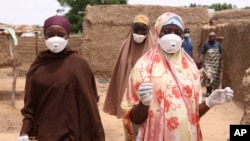ABUJA, Nigeria - The international aid group Doctors Without Borders says at least 4,000 children are suffering from lead poisoning as a result of artisanal gold mining in Zamfara State in Nigeria. The group says emergency federal funds are needed to prevent many of these children from dying. Activists say the funding has been approved, but none of it has been made available to help the people in Zamfara.
Zamfara State is literally sitting on a gold mine. Nigeria's Doctors Without Borders head, Ivan Gayton, says since gold prices surged in recent years, small time miners can sometimes sell their gold for as much 70 or 80 percent of its international market value.
This means villagers who were living on a few dollars a day, are now living on $10 or $15 a day. But unsafe mining practices are releasing so much lead into the community that it is killing local children. Roughly 400 children have died in the past two years, thousands are awaiting emergency treatment, and nobody knows how many others are in need of urgent care.
Untreated, lead poisoning can cause a wide array of physical and developmental disabilities, but for these children, with 20 to 70 times the amount of lead in their blood than is considered safe, it often leads to seizure, coma and death.
Gayton says if safe mining practices are introduced, contaminated villages are cleaned up and the children are treated, the crisis could be contained.
"Safer mining is possible," said Gayton. "It's absolutely possible for these people to pursue this economic activity with the resources that they are living on top of without finding death and contamination."
At a conference in Abuja, activists and scientists discussed strategies to help Zamfara. Gayton says one of the purposes of the meeting was to convince federal officials to take action. He says $5 million needed for cleanup operations and establishing safe mining practices has already been promised, but the money is nowhere in sight.
The conference, he added, did not appear to convince officials to release the funds.
"Minister of Mines, Minister of Environment, Minster of Health were not able to attend," added Gayton. "Neither were their permanent secretaries or their deputies so we really didn't have any decision making presence at the conference."
Zamfara Commissioner for the Environment Mouktar Lugga says seven villages have already been cleaned up. He says if the state can get help, in a few years, Zamfara could be known for its successful use of resources, not its suffering.
"Children are falling sick and the government -- the state government -- is doing all we can espouse to see that this problem is brought to a good conclusion. But honesty we have a lot in our hands," said Lugga.
Doctors Without Borders says older children and adults may also be sick, but they have not tested them because lead has the most impact on small children. Gayton says banning gold mining is not an option because as long as the price of gold remains high, the "gold rush" will continue.
Nigerian 'Gold Rush' Poisoning Children





